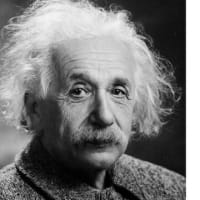
It seems that every week someone claims they’re smarter than Einstein. Believe me, they’re not. Of course, first off, we have to define intelligence. Then we have to compare the criteria for intelligence between the claimant and Dr. Einstein. But even before we do that, we can check claims made regarding Einstein and any claimant.
From what I have seen people are centring their claim to fame on the General Theory of Relativity. No one is claiming Einstein’s theory of Brownian motion, photoelectric theory, Special Theory of Relativity or theory of mass-energy equivalence as bogus. No one is quite that stupid although the clock is ticking. It seems, there is a herd of twits claiming the General Theory of Relativity has to be bunk. Or incomplete. Or there’s something wrong with it.
A friend of mine knew Einstein. He attended Einstein’s lectures at the University of Berlin in 1925. According to my friend, Einstein was a very nice man and a truly humble soul. He would never fail anyone. He gave everyone an “A”. And no one could do any of his homework assignments because they were way too hard. But he gave his students “A”s anyway. He was also an absolutely terrible lecturer with impossible to read chalkboard writing and was always lost at the front of the lecture theatre facing the blackboard, close to its surface, and mumbling the lecture incoherently. But a really nice guy. This is probably due to the fact that some mentally deficient and socially insecure bonehead at the University of Zurich had failed Einstein in a course just to teach Einstein “a lesson” and ending up costing Einstein from getting a job in academia and creating huge stress on him and his young family. It is a blight on the University of Zurich. That professor was probably threatened by Einstein and wanted to appear smarter than him. He failed.
So Einstein knew the consequences of injustice and the damage academia could inflict on students. He never wanted to hurt anyone. To me, that is a mark of intelligence and maturity. Einstein never said he was smarter than anyone, really. But he did like to joke about the confusion in quantum mechanics. Believe me, there is a ton of confusion in quantum mechanics. So Einstein, if he is still capable, has lots of ammunition.
From what I’ve seen, the claim centres around something called Quantum Gravity. There is a very funny story surrounding Quantum Gravity that concerns Dr. Werner Israel and Dr. Erwin Schrodinger. I’ll tell it later.
Right now I’m going to use Dr. Sabine Hossenfelder’s statements in her video from a year ago to make my point. (https://youtu.be/Ov98y_DcvRY). I have a lot of respect for Dr. Hossenfelder and recommend her book, Lost in Math. Sabine is critical of much of the work in modern science and explains things clearly. Note that she is completely wrong regarding dark matter, string theory and quantum gravity, but never mind. Also note that Sabine does not outrightly claim to be smarter that Einstein; she just makes statements that make her appear she never read Einstein’s original work.
Some of Einstein’s work can be found in: The Principle of Relativity, (New York, N.Y.:Dover Publications Inc., 1923),Einstein, Albert, Lortntz, H. A., Weyl, H.. Minkowski, H., and particularly in: "The Foundation of the General Theory of Relativity", also contained in “The Principle of Relativity”. In it Einstein combines both a theory of gravity and Maxwell’s Equations into one overriding tensor equation. He does it from first principles. Because Einstein includes both electromagnetism and gravity into one equation, he calls it the General Theory of Relativity. In reality, it is a mathematical derivation which can then be applied to physical phenomena. The mathematics is correct. He did not make a mistake. He made his mistake later in 1916 by listening to some clown in astronomy who couldn’t match Einstein’s work with the night sky over Europe as seen at the time with the naked eye. But that is a story for another time.
All that being said, what do we mean by a complete theory as opposed to an incomplete one? In order to answer this question, I am going to have to take great liberties with Green’s Theorem, which is a complete theorem, but you can check it and call it bunk if you like. Nevertheless, Green’s Theorem shows that any mathematically modelled system has three parts. And if you can find two of those parts, you can find the third. These parts are:
1. an equation describing the system.
2. a differential equation describing how the system changes.
3. boundary conditions of the system, usually including initial conditions.
If your theory covers all three of these, you have a complete theory.
For example, Maxwell’s Equations describe electromagnetism from extremely small distances out to an infinite distance. Everything about electromagnetism is described by Maxwell’s Equations in that region of the universe: from the extremely small to the infinite. Within those boundaries, Maxwell’s Theory of Electromagnetism is a closed theory. It is complete and there is nothing more to add to it.
Einstein’s General Theory of Relativity describes gravity and electromagnetism from the world of the very small to an infinite distance. It is a closed theory within those boundaries. It is complete and there is nothing more to add to it.
Now to look at the world of the very small. That is covered by a different theory which is described by Erwin Schrodinger in his equation called Schrodinger’s equation. Dr. Schrodinger published his equation in 1926 and discredited the Bohr model of the atom later in 1935. Schrodinger’s equation describes a complete theory with boundary conditions from the very small to the infinitesimal. And the boundary equations are contained within the equation. It is a closed theory within those boundary conditions. It is complete and there is nothing more to add to it.













※コメント投稿者のブログIDはブログ作成者のみに通知されます